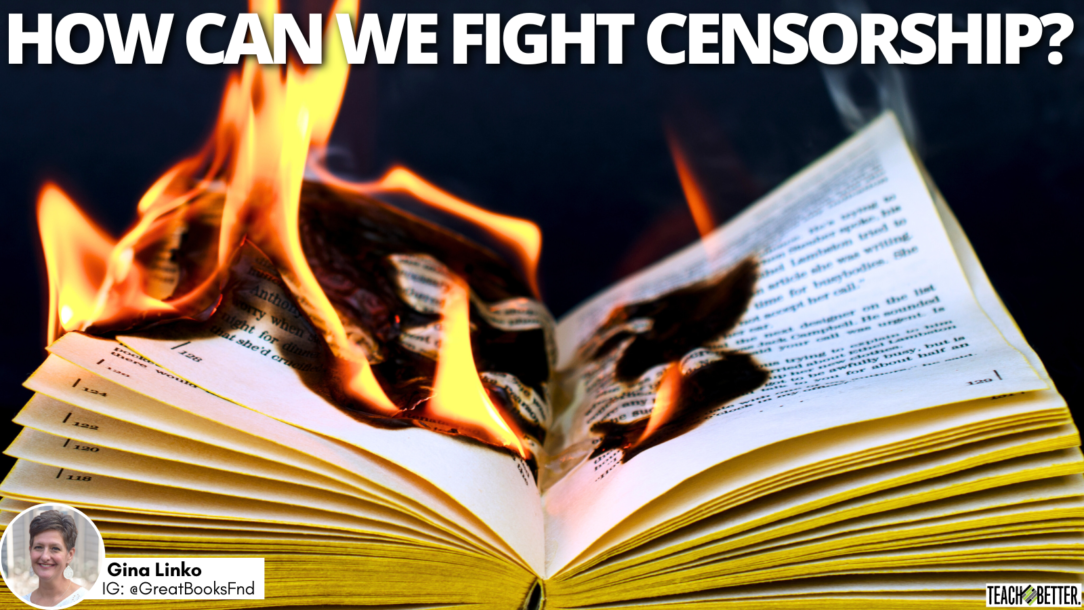TL;DR:
- Book challenges in the US nearly doubled in 2022, focusing largely on children’s and young people’s books.
- Response to censorship includes President Biden’s plan to appoint a federal coordinator to address book bans, along with efforts from educational organizations, librarians, and publishers like Penguin Random House.
- Various groups, such as the Great Books Foundation, are actively fighting censorship by promoting diverse literature and fostering critical thinking among students.
Censorship by the Numbers
Early in 2023, the American Library Association (ALA) reported that the number of book challenges, unique titles put forth for book bans/censorship, nearly doubled in 2022 compared to 2021. In 2021, the number of challenges reported was 729, and in 2022, it rose to an unparalleled number of 1,269.1 Book banning in America has reached a fever pitch. Much of the focus of this censorship is on children’s and young people’s books within schools and community libraries.
Many of the books being banned are written by or feature people of color and members of the LGBTQ community. In response to one such ban targeting her poems, Amanda Gorman, National Youth Poet Laureate, explained in a USA Today article that the book-banning craze is currently “creating a bookshelf that doesn’t represent the diverse facets of America.”
She went on to explain, “I’m fine with those parents not liking my poetry, that’s completely in your right. But when we get to a situation where that one person’s dislike of my work leads to everyone else not having access to that, that is a huge issue, I think, because it encroaches on our freedom to really absorb and love and enjoy literature from where we are.”2
Our goal is to help students take part in respectful, collaborative discussions that prepare them to be informed citizens who can actively participate in a democratic society. - Gina L. Click To TweetCurrently, many government officials, institutional leaders, parents, and students themselves are pushing back against the current rise in censorship.
President Biden plans to appoint a federal coordinator within the Department of Education to address the possible unconstitutionality of and discrimination inherent in these book bans.3 The Great Books Foundation, along with many other educational organizations, believes in the power of knowledge and that students should be exploring a range of ideas and thinking critically.
In order to create students who are thinkers and can engage in respectful, civil discourse, we need challenging and diverse texts to serve as objects of inquiry. The National Education Association reports that educators and librarians, who have long been trained, tasked, and trusted to curate texts for students, are “pushing back against those who want to censor literature.” They argue that “students should have access to resources that help them better understand the lives, cultures, and experiences of different people.”4
How Can We Fight Censorship?
How exactly can we fight this censorship? In several ways. First, we can read and share banned books, as well as draw attention to how the current censorship movement is being propelled by only a few specific extreme advocacy groups. It’s also important to search out information and to join public discourse, so the arguments from educators, readers, and the public against censorship are as vocal and headline-grabbing as those from the book-banners themselves.
Joining groups that are combating censorship can also be effective.
Many well-known institutions are organizing in a fierce and large-scale fashion, such as the state of Illinois passing a ban on book bans within its public schools and libraries, becoming the first state to do so. The world’s largest publisher, Penguin Random House, has also entered the fray, filing a lawsuit against a book-banning school district in Florida.5 PEN America, the American Federation of Teachers, and the National Educators Association are all at the forefront, fighting against censorship. And, of course, the ALA has hosted its Banned Books Week for years to bring together the literary community and to raise awareness of the dangers of censorship. This year, however, the ALA has introduced a new program as well.
At the ALA’s recent annual conference in Chicago, author and activist Ibram X. Kendi gave a moving keynote speech at the Rally for the Right to Read: Uniting for Libraries and Intellectual Freedom. In his speech, Kendi praised librarians as modern-day freedom fighters. “The freedom fight has chosen every single person who treasures books, who treasures knowledge, who treasures the truth. The freedom fight has chosen every single American, who recognizes that an institution without books about racism, without books about homophobia, without books about the Holocaust, without queer characters, without books by authors of color, is not a library—it is a propaganda shop masquerading as a library.”6
[scroll down to keep reading]Organizations Joining the Fight
The Great Books Foundation, creators of Junior Great Books® and the Shared Inquiry™ method of learning, is among many organizations that are joining the fight against censorship. Central to Junior Great Books is the sharing of engaging texts, positing ideas, debating issues, and thinking critically.
Our goal is to help students take part in respectful, collaborative discussions that prepare them to be informed citizens who can actively participate in a democratic society. We can’t do that if we allow a small minority of people to ban books, censor thinking, and curate a bookshelf that isn’t representative of today’s classroom. Instead, we invite you to develop educators who use our inquiry-based strategies to enable students to read rich, diverse texts and to share their ideas with peers in an atmosphere where their contributions are welcomed and valued.
Notes
- “American Library Association Reports Record Number of Demands to Censor Library Books and Materials in 2022.” American Library Association. March 22, 2023. https://www.ala.org/news/press-releases/2023/03/record-book-bans-2022
- Jeanine Santucci. “Amanda Gorman Says Banning Books ‘Encroaches on our Freedom’ after Poem Restricted in School.” USA Today. June 7, 2023. https://www.usatoday.com/story/news/education/2023/06/07/amanda-gorman-speaks-out-against-book-bans-in-schools/70298824007/
- Franco Ordoñez. “Book Bans Are on the Rise.” NPR. June 8, 2023. https://www.npr.org/2023/06/08/1180941627/biden-pride-month-book-bans
- Brenda Alvarez. “The Freedom to Read and Learn: Educators Respond to Book Bans.” National Education Association. January 31, 2022. https://www.nea.org/advocating-for-change/new-from-nea/freedom-read-and-learn-educators-respond-book-bans
- Andrew Atterbury. “Penguin Random House, Others Sues Florida School District over Book Bans.” Politico. January 31, 2022. https://www.politico.com/news/2023/05/17/penguin-random-house-others-sues-florida-school-district-over-book-bans-00097501
- Andrew Albanese. “Freedom Fighters: Ibram X. Kendi Kicks Off ALA 2023 with a Powerful Message to Librarians.” Publisher’s Weekly. June 23, 2023. https://www.publishersweekly.com/pw/by-topic/industry-news/libraries/article/92618-freedom-fighters-ibram-x-kendi-kicks-off-ala-2023-with-a-powerful-message-to-librarians.html
About Gina Linko
At the start of her career, Gina taught both middle-school language arts and college English, where she learned the true, incomparable value of a lively, thoughtful, text-centered classroom discussion. Now, she has worked in educational publishing for many years, and as the production editor at Great Books, she is passionate about Shared Inquiry and how it can enrich students’ literacy, their social and emotional intelligence, and their critical thinking.




